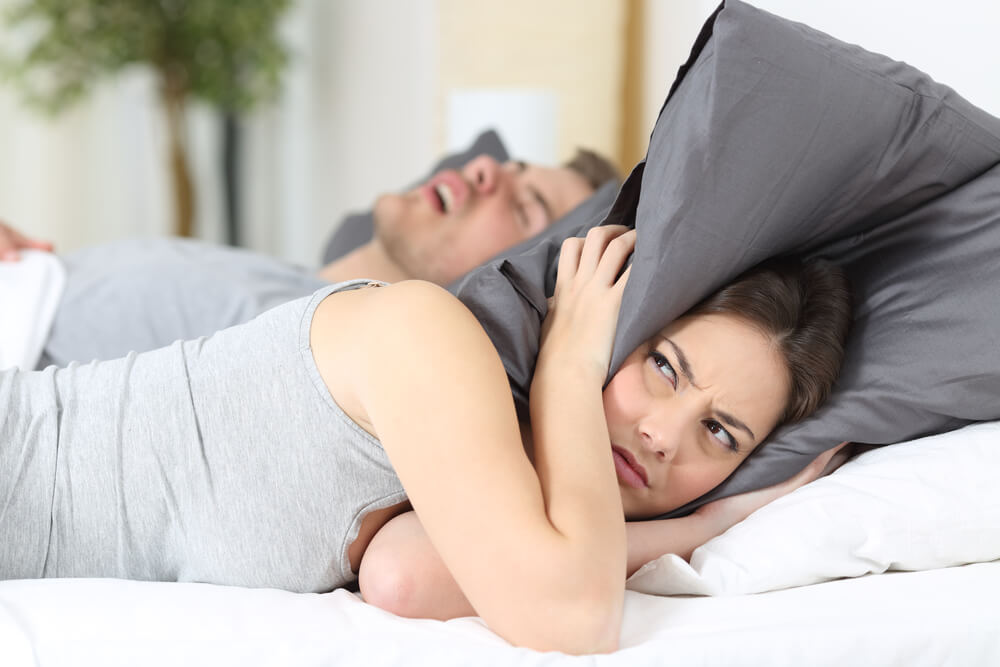
Snoring, while common, can indicate a significant problem.
If your loved ones are accusing you of keeping them awake at all hours of night and you wake up feeling tired, listless, and unrested, there’s a chance you’re suffering from sleep apnoea. Read on to find out how Extreme Dentistry can help!
Sleep apnoea is a disorder that affects your breathing and can be very dangerous. This is because sleep apnoea hinders or can even stop you from breathing while asleep. This has a detrimental effect on the sufferer – difficulty focusing, lethargy, and irritability due to exhaustion are common complaints from those with this condition.
More concerning, however, is the increased risk of potentially fatal medical events – sleep apnoea patients are far more likely to suffer a stroke, heart disease, hypertension, or other dangerous health crises.
What Causes Sleep Apnoea?
In patients suffering from obstructive sleep apnoea (OSA), the muscles at the back of the throat relax during sleep. These muscles support all the soft tissue in the throat – the soft palate, the tonsils, the uvula, and the walls of the throat itself. Because of the sudden lack of support, all this soft tissue collapses, cutting off the airway and the body’s supply of oxygen. Therefore, sleep apnoea patients are prone to snoring, gasping for air, or even choking in their sleep.
While OSA can affect everyone, some risk factors can increase your likelihood of suffering from sleep apnoea. Habitual use of sedatives and alcohol can heighten your risk, as can lifestyle factors such as smoking or obesity. Older men are two to three times more likely to suffer from OSA than women. Additionally, if a family member suffers from OSA, you are more likely to develop the disorder yourself.
What Are Sleep Apnoea Symptoms?
The most immediately obvious symptom of OSA is incredibly loud and disruptive snoring. While this may be less obvious to people who live alone, if you share your living space with a partner or family who reports that you habitually ‘saw logs’ in your sleep, you should consider the possibility of a sleep study to check for OSA.
Indeed, if you’re waking up feeling unrested, it’s a prime indicator of something being amiss in your sleep patterns. In people suffering from OSA, the brain recognises the sudden lack of oxygen during sleep, and physically ‘jolts’ the person awakes for them to breathe. In extreme cases of OSA, this can happen as many as 50 times per hour! These ‘micro-arousals’ are so swift that the sufferer may not even be aware of them, other than feeling the effects of such disturbed sleep the following day.
Sufferers of OSA tend to report higher incidents of irritability, difficulty in concentrating, memory loss, and even physical clumsiness. Further things to watch for are frequent night sweats, morning headaches, or waking up with a sore throat and dry mouth.
How Do I Get Diagnosed with Sleep Apnoea?
OSA is generally diagnosed through a sleep study at a specialist sleep clinic. This involves overnight monitoring for heart, lung, and brain activity, breathing patterns, movement, and blood oxygen levels. There are also options for at-home overnight monitoring. These are slightly more simplified and usually measure heart rate, blood oxygen levels, and breathing patterns.
Should an at-home monitoring kit detect any abnormalities, you may be referred for a more in-depth study at a clinic. Diagnosis of OSA is always confirmed by a specialist sleep physician – your GP or dentist can refer you if they suspect OSA, but they cannot officially diagnose you.
What Are the Treatment Options for Snoring and Sleep Apnoea?
At Extreme Dentistry, we offer several options for the treatment of excessive snoring and sleep apnoea. We provide Constant Positive Airway Pressure (CPAP) devices, which are the traditional method of treating OSA. While CPAP machines are effective, they are also noisy and uncomfortable, with most people discontinuing their use after a year or two.
While CPAP machines may be the best option for severe sleep apnoea, there is another device that can help. The Medical and Dental Sleep Appliance (MDSA) was designed by a team of Australian dentists, dental technicians, and sleep physicians, and is a non-intrusive device worn in the mouth during sleep. The MDSA moves the tongue and jaw forward and gently holds them in place during sleep. This helps to prevent the collapse of soft tissue and can greatly mitigate snoring.
How Can We Help?
Whether you need a CPAP machine or an MDSA, Extreme Dentistry can assist. We provide both options for treatment and will ensure that you are fully informed as to the pros and cons of each. Treating OSA is crucial for improving not only the quality of sleep, but also the quality of life.
To find out more about treatment options at Extreme Dentistry, please see here.
To contact us, please call 08 8948 1225 or drop us a message online.